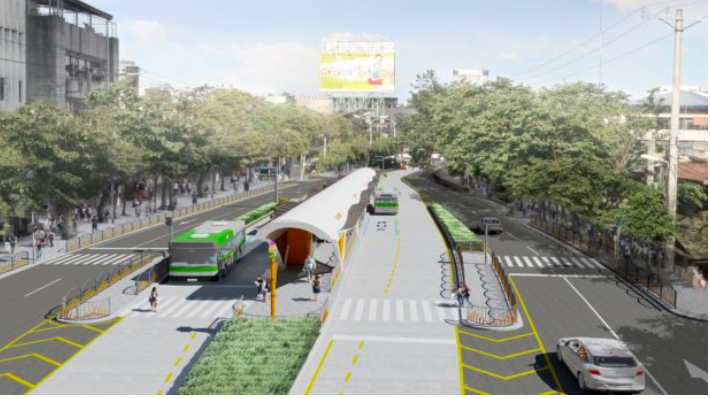
Architectural Design of one of the stations of the Cebu City Bus Rapid Transit Project. Photo from Cebu City BRT Facebook
CEBU CITY, Philippines — The chair of the Cebu City Council’s Tourism Committee is requesting the Cebu City Transportation Office (CCTO) to draft a development plan for the city’s transport system by 2030.
Councilor Jocelyn Pesquera made this motion during her privilege speech during the council’s regular session last Wednesday, Sept. 11.
Pesquera specifically requested the CCTO and the City Planning and Development Office to prepare the Cebu City Transport System Development Plan 2030 which is similar to Moscow’s Transport System Development Program 2030.
The development plan demonstrated how Moscow began their vision for the 2030 transport system, the councilor said.
She also presented a sample of Moscow’s 2030 development program, which she obtained during her recent trip to Moscow, Russia.
In her privilege speech, Pesquera recalled that it was suspended Mayor Michael Rama who “planted the seed of friendship and cooperation with officials of the Moscow government” during their visit to Vladivostok for the Eastern Economic Forum in September 2023.
As a result of that event, Pesquera said Moscow invited Cebu City officials to visit their city last May, with Rama representing the city alongside her and other officials.
“In that particular visit, the Moscow government presented to us their proposal to enter into a partnership agreement and as well as the transport data agreement with the city government. And because of that it was submitted to the council,” Pesquera said.
On August 20, Acting Mayor Raymond Alvin Garcia signed the Memorandum of Cooperation, joined by Honorary Consul to Russia Armi Lopez Garcia, Cebu City officials, and Russian officials who attended via online conference.
Pesquera explained that the partnership covers more than just transportation. It also includes areas like the economy, urban planning, the environment, entrepreneurship, science, education, trade, culture, arts, sports, and tourism.
After the signing, Pesquera said they brought the document to Russia when the Cebu City Government sent a delegation to participate in the International Transport Summit and BRICS International Forum.
At the summit, they learned about transport system developments in Moscow and other countries. Additionally, they had the opportunity to meet with representatives from St. Petersburg, who expressed interest in partnering with Cebu City in the future.
READ: What’s the future of Cebu BRT? Phase 1 completion now uncertain
While Moscow focuses more on transportation, Pesquera said Saint Petersburg expressed interest in partnering with Cebu City in areas like the shipping industry, medical technology, and tourism.
She also mentioned discussions about a train system and recalled the old railway that once connected Argao in the south to Danao City in the north.
“Unfortunately, things changed. The policy of the government changed, the mindset of people changed. So, there is really also a need for us to study on what are we going to see for the next ten years and what improvements can we still do. It’s not really late, we don’t have to copy,” Pesquera said.
Pesquera added that the partnership with the Moscow government would provide local legislators with valuable technical knowledge.
“We don’t have to reinvent things because they have already accomplished it. They have already studied, researched everything, and they have already implemented it. What we just need is to learn from them and maybe once we also have the necessary investors, maybe we can also replicate what they had done in their country,” she added. /clorenciana